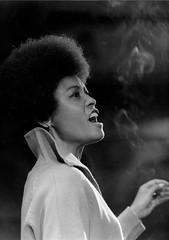
Abbey Lincoln(1930-2010) joined the ancestors on August 14, 2010. She was a pionering Jazz artist, actress and political activists. Her career complimented the Black Liberation Movement of the same period.
Originally uploaded by Pan-African News Wire File Photos
by: John Pietaro
August 16 2010
The struggle against racial injustice has lost a most stirring cultural worker; another artist of conscience is gone with passage of time. But wasn't that a time?
Vocalist, actress and activist Abbey Lincoln, who died Aug. 14 at age 80, captured the energy and drive of an era in recording and film as few others could, staring down the camera's probing eye and shouting back into the microphone with the sure-footedness of a warrior-woman. She refuted the oppression of Hollywood's typecasting as boldly she rebelled against song's harmonic structure, over and beyond the accepted norms. Lincoln's art was indeed her most telling weapon and she brandished this with a certain fearlessness that would rock the white-dominated entertainment industry during years of social upheaval. Her most recalled work, "We Insist! Freedom Now Suite," angrily challenged those singing of overcoming some day; brimming with restlessness, hers was not a protest art of patience.
Anna Marie Wooldridge was born in Chicago on Aug. 6, 1930, when streams of unemployed workers roamed the streets and the African American population, already struggling under the heavy boot of apartheid America, knew burdens of untold proportions. For those already poor the Great Depression was a furtherance of the deprivation they'd experienced in the so-called boom years, but now with a new urgency, a new desperation. The entertainment industry was one means to economic salvation in the working class Black community, and Chicago - the site of the momentous development of jazz over the decade before - was a hotbed of activity. Though largely raised in a rural suburb, Lincoln absorbed the fierceness of transplanted New Orleans. Her singing speaks of the ages, smoky-throated hipness informed by Billie Holiday, cool urban blues and raw field hollers by way of sumptuous ballads and sizzling swing.
The newly christened "Abbey Lincoln," relocated on the West Coast, became an in-demand performer on the nightclub circuit. A double threat, Lincoln recorded her debut album the same year she was cast in the Jayne Mansfield movie, "The Girl Can't Help It" (1956) which also featured Little Richard and a bevy of popular musicians. With the hope of a glitzy film career waiting in the wings, the beautiful young actress instead refocused her efforts on collaborations with drummer-composer Max Roach, whom she would be married to from 1962 through 1970. Starting with 1957, their projects together were revolutionary on several levels. Woven not with the simple packaging of songs but with the serious intent of a singular, unified message, they recorded several concept albums, most powerfully the "Freedom Now Suite" (1960), a hallmark of protest music. Air-borne melodies descend into guttural moans, interspersed with burning post-bop phrases and expansive harmonies. But Lincoln stretched the scope still further. Her speech-song vocal on "Driva Man" is a chilling lesson in the power of song as a force of social protest, a "Strange Fruit" for the civil rights era.
During the '60s Lincoln continued working with Roach but also took to the stage or studio with other jazz legends including Sonny Rollins and Eric Dolphy. However by 1964 she had successfully brought the message back to the film genre, co-starring with the grossly underrated actor Ivan Dixon in "Nothing But a Man," a bold depiction of the racism so rampant in the deep South. Shortly thereafter she was paired with Sidney Poitier in the moving "For Love of Ivy" (1968), where Lincoln was cast in the title role.
By 1970 Abbey Lincoln became a common sight on television and film, offering scant examples of her power as a vocalist, but in 1980 she had something of a musical resurgence. In the past three decades, Lincoln performed widely and recorded numerous collections of relevant jazz works, often featuring her own compositions. Though her lyrics had been a part of several earlier collaborations, Lincoln's focus on her own material began in earnest in 1972 while traveling through Africa. She came to see her calling as that of a storyteller, and upon re-entering music performance full-time, encompassed a large catalog of original material. Over the course of a series of albums exploring her career's expanse, she received much-deserved critical acclaim in recent years. To most in the crowded venues she played, Lincoln was at the zenith of her art.
Abbey Lincoln remained a thriving, independent performer into her final years, never again allowing the gauntlet to slip away, never once refraining from speaking truth to the power that might otherwise have sought her silence.
No, Driva Man. No.
No comments:
Post a Comment